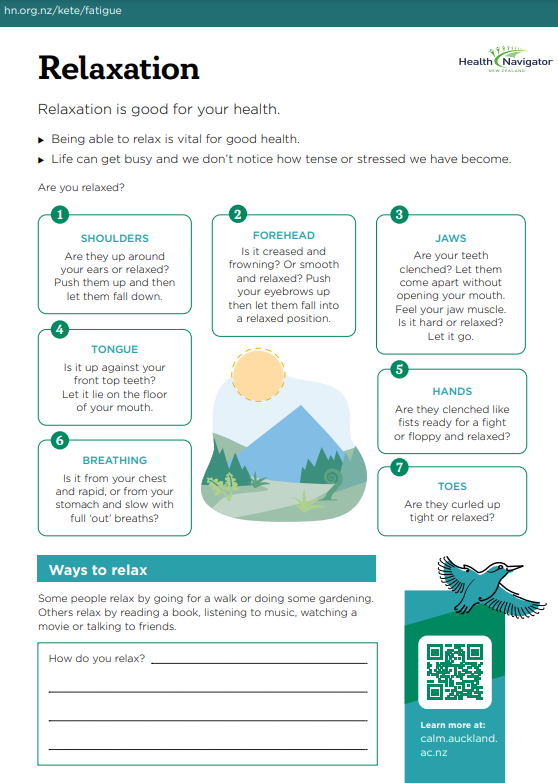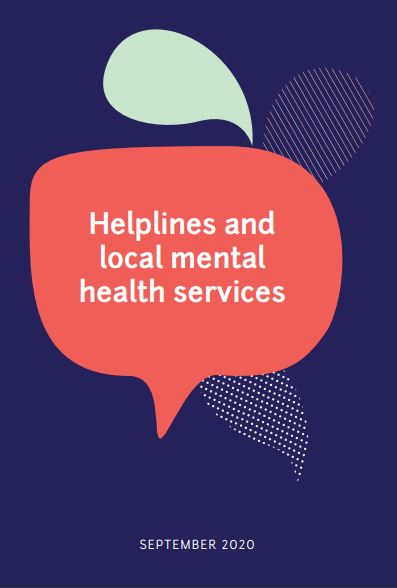- If you have ongoing mental distress and your ability to function is affected, you may be diagnosed with a mental health condition.
- Mental health conditions refer conditions that affect your mood, thinking and behaviour. Examples include depression, anxiety, bipolar disorder, schizophrenia, eating disorders, PTSD, psychosis, perinatal depression, obsessive compulsive disorder (OCD) and addictive behaviours.
- The good news is that there are treatments and support to help you with these conditions, but the sooner you get help the better.
- There is also plenty you can do to reduce your risk of developing a one of these condition and to help yourself get better if you do develop one.
- If you are feeling distressed, talk to someone now. Phone or text 1737 anytime, day or night.
Low or no data? Visit zero.govt.nz, scroll down the page then click on our logo to return to our site and browse for free.
Mental health conditions
Key points about mental health conditions
- We all experience some ups and downs, sometimes feeling low and other times being happy.
- A mental health condition occurs when ongoing symptoms cause frequent distress and affect your ability to function.
- It can influence the way you think, feel, behave and/or relate to others.
- There's treatment and support to help you with a mental health condition, and things you can do to help yourself get better.
- This page focuses on mental health conditions that can be formally diagnosed.

If you have mental health condition, you can experience problems in the way you think, feel or behave. This can significantly affect your relationships, work and quality of life.
Symptoms differ from person to person, but a common sign is if your behaviour changes, suddenly or gradually. These changes can sometimes be a reaction to life events, especially if you are young. Being in a constant state of mental distress can be very damaging, mentally and physically.
Diagnoses for mental health conditions fall into 2 types: psychosis and mood disorder. The symptoms for each differ.
| Psychosis | Mood disorder |
|---|---|
| This includes disorders such as schizophrenia and bipolar disorder (previously called manic depressive illness), where you lose touch with reality. | This is where you experience overwhelming feelings of sadness, anxiety, fear, inability to sleep, loss of interest in things you once enjoyed, changes in appetite etc. These changes make it difficult to cope with work, study, relationships and other demands. If you feel like this for a month or more, and it gets in the way of daily living, you could be depressed. |
| Your ability to make sense of thoughts, feelings and other information is seriously affected. What you see, hear and feel is real to you, but people around you do not share your experiences. | Getting help if you are depressed is important because it often occurs with other mental health conditions, such as anxiety or substance abuse disorders, as well as with other health conditions such as diabetes. Early diagnosis and treatment of depression is critical to healthy emotional, social and behavioural development. |
| Effective medication and support from professionals mean that most people who experience this type of distress are able to live productive and rewarding lives. | Most mood disorders can be effectively treated, usually with a combination of medication and talking therapy. Together these help you understand your mental health condition, manage your symptoms and lead a satisfying life. |
With appropriate care, you can recover from a mental health condition. Get help as soon as you realise you have mental distress, before it develops into a diagnosable mental health condition. This will make your journey to recovery easier. But whenever you reach out, you will no longer be managing on your own, and with support your situation will improve.
One of the most important things that help is compassion and understanding from those around you. A person with a mental health condition often faces isolation and discrimination from others – some people may react with embarrassment, rejection and abuse if they don’t understand why you are acting unusually. Tell your friends, family and whānau what is happening for you – in many cases they will be able to help you.
- Share your thoughts and feelings with friends, family/whānau or a counsellor.
- Talking your problems through as soon as they appear can really help relieve stress and anxiety.
- Get help as soon as you notice any sign of mental distress before it develops into something more serious.
- Eat nutritious food, get enough sleep and exercise regularly. Doing these things can trigger a chain of healing effects – especially when you feel anxious or under stress.
- Build and maintain your self-esteem. You will feel better more often, enjoy your life more and do more of the things you have always wanted to do.
- Learn to relax. There are many relaxation techniques and mindfulness methods to chose from.
- Spend time doing the things you love to do, such as sport, hobbies, gardening, time in nature or with your whānau.

Image credit: Healthify He Puna Waiora, NZ
If you think you or someone close to you is experiencing any kind of mental distress or a diagnosable mental health condition, there are many places to go to get help. You can start with seeing your GP or primary healthcare nurse, or texting or phoning 1737 for free any time of the day or night.
Find a mental health service within your area.(external link)
There are also lots of self-help resources, like websites and books, right through to seeing a specialist mental health professional or accessing an emergency service. The NZ Mental Health Foundation(external link) has a comprehensive list of mental health support services.
If you have a family member who you are concerned about and would like support, you can contact Supporting Families(external link) – an organisation dedicated to helping families living with mental illness.
Mental distress – what you need to know
Mental health support
Mental health topics
Mental health and wellbeing apps
Mental health services for young people
Supporting a friend with a mental health condition
When your parent has mental distress
Practical advice to support you on those bad days
Addiction
Anxiety | Mate māharahara
Depression topics | Mate pāpouri
Bipolar disorder | Mate rangirua
Eating disorders
Phobias
Post-traumatic stress disorder (PTSD)
Psychosis
Social anxiety disorder
Stress | Mate māharahara
Obsessive compulsive disorder (OCD)
Staying well(external link) Mental Health Foundation, NZ
Depression.org(external link)
Aunty Dee(external link)
SPARX(external link)
The Lowdown (external link)
CALM – Computer Assisted Learning for the Mind(external link) NZ
Just a Thought(external link) NZ
Mental illness and discrimination(external link) Like Minds, Like Mine
#RadNotBad – stories about people's experience of mental illness(external link) Mental Health Foundation, NZ
Ignite(external link) NZ
Asian Family Services(external link) Free, professional and confidential psychological support to Asian communities. Phone 0800 862342
Find out how to tell if someone is struggling with their mental health(external link) BBC, UK, 2021
Online self-help programmes and courses
Here are some online resources that are designed to help you manage depression and anxiety. Some are free, some have a cost and some require a prescription from your doctor.
Programmes |
Just a Thought (NZ)
|
Small Steps (NZ)(external link)
|
Beating the Blues (UK)(external link)
|
This Way Up (Australia)(external link)
|
Computer-assisted learning for the mind - CALM (NZ)(external link)
|
Peer Zone(external link)
|
Mental Health 101(external link)
|
Youth and Mental Health 101(external link)
|
Moodgym (Australia)(external link)
|
eCouch (Australia)(external link)
|
Resources
Brochures
The Royal College of Psychiatrists website (UK) has mental health information translated into multiple languages(external link).
Te Kete Fatigue – relaxation [PDF, 88 KB] Healthify He Puna Waiora, NZ, 2022
Te Kete Fatigue – deep breathing [PDF, 91 KB] Healthify He Puna Waiora, NZ, 2022
Have a friend or family member who’s unwell? [PDF, 1.1 MB] Healthify He Puna Waiora, NZ and Mediboard, 2023
Helplines and local mental health services(external link) Mental Health Foundation, NZ, 2022
Apps/tools
See our page Mental health for healthcare providers
Brochures

Healthify He Puna Waiora, NZ, 2022

Healthify He Puna Waiora, NZ and Mediboard, 2023

Mental Health Foundation, NZ, 2022
Credits: Healthify editorial team. Healthify is brought to you by Health Navigator Charitable Trust.
Reviewed by: Rudy Bakker, Mental Health & Addiction Coordinator, East Health Trust, Auckland
Last reviewed:
Page last updated:





